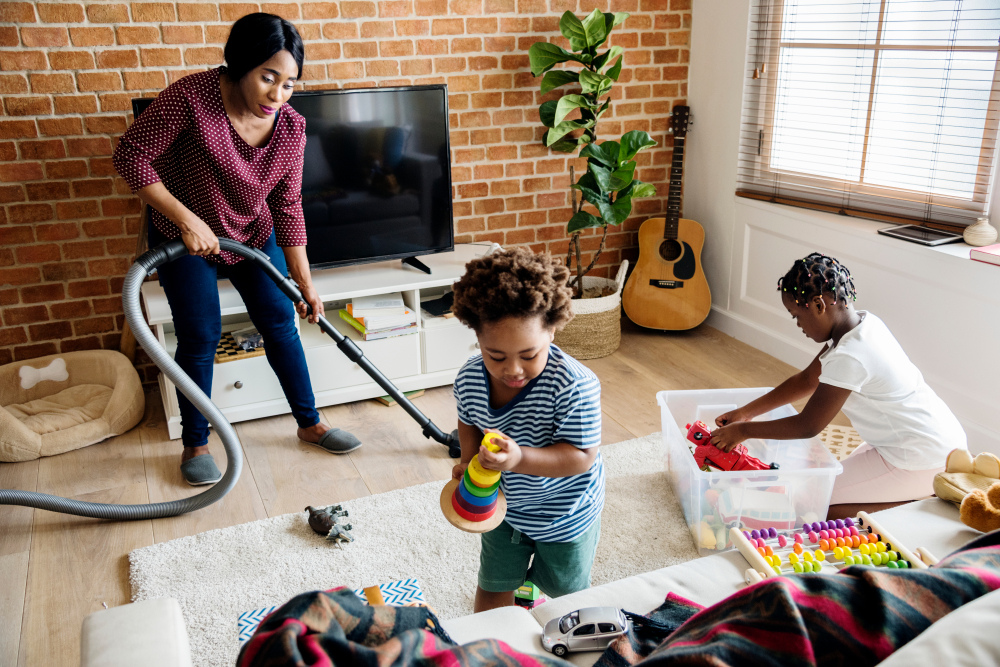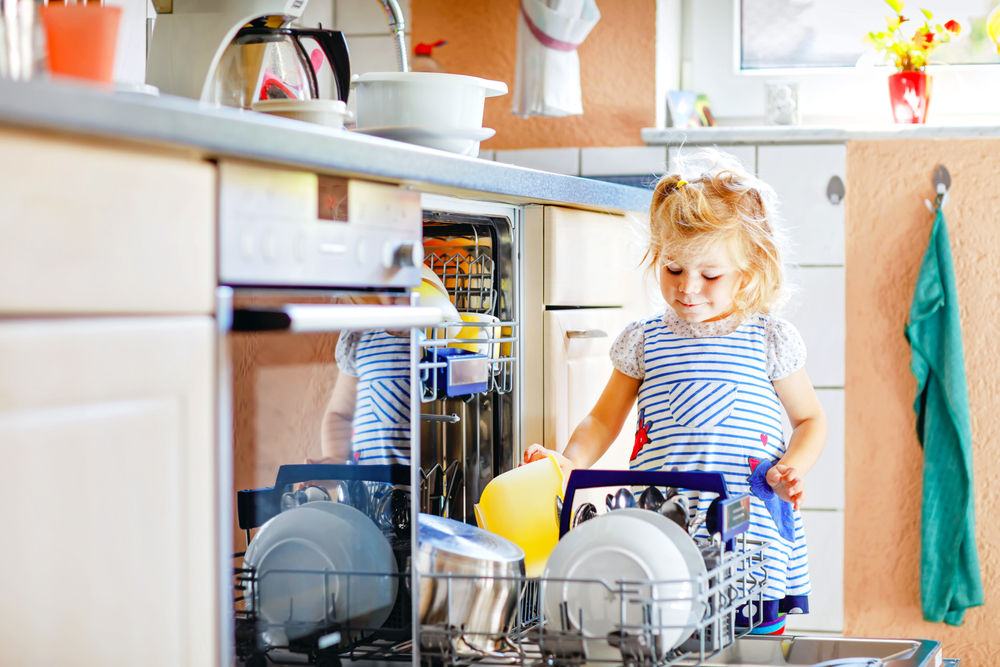
December 28, 2022
Kids Chore Ideas for Every Age
Kid chores benefit the whole family by keeping kids busy and involved in family life and giving their parents a little idle time. On top of that, kid chores help prepare kids for adult life by teaching them core life skills that go beyond just cleaning. An extensive study has proved that children who do chores at home grow up into self-disciplined and responsible adults with solid work ethics.
In this post, you will find kid chore ideas from toddler to high schooler age, as well as tips on making the process enjoyable.
Why Are Kids Chores Important?
Kids need to know they are a part of something bigger. They realize they belong to a family by sharing their household tasks. They feel needed when others ask them for HELP and RELY on them. This way, through chores, besides essential hygiene skills, kids
- Learn how to cooperate (especially if they have siblings),
- Become independent by mastering vital skills,
- Understand that life is not centered around their needs (there are also needs of the family, community, etc.),
- Find out that their contribution is valuable, and finally,
- Learn to be RELIABLE.
The most important life lesson children can learn from doing chores is that a good result takes effort. If they learn to work for the common good at an early age, they will be able to build remarkable careers and strong marriages as adults.
When is the Best Time to Introduce Chores?
It is never too early for chores. Parents usually underestimate their kids, thinking that they must be ready to do chores first. However, in reality, the readiness to learn is more important. Kids of all ages can cope with age-appropriate tasks after some learning and with their parent’s supervision. If you start introducing chores as early as the toddler years, you will be able to avoid protests and conflicts down the road as kids become more obstinate as they grow up.
Should I Make a Chores Chart?
There are many ways of getting your kids involved in chores, from the good old chores chart to modern chore apps where children can earn points for completing chores. The chore chart is the simplest option to accomplish. You only need a piece of paper and a pen (maybe, plus some funny stickers for your child’s age).
First, make a list of all chores you would like your kid to do (according to their age). If you have more than one child, you can let them choose tasks to their liking. Then make a chart containing a list of daily chores, deadlines, and a place for the checkmark (or a sticker).
Ensure your child can “read” the chart. If a child cannot read yet, use pictures of chores instead of words. Specify what exactly the task includes (microtasks) and avoid vague task descriptions as kids may misinterpret the task in their favor. Deadlines are important as they won’t let a child postpone doing the chore, hoping you will forget or do it for them. For younger kids, you can use the “when-then” technique: “When you collect your toys, you can go to bed”.
Giving Your Kids Allowances
Paying your kids for doing chores is a bad idea because they won’t learn responsibility if you motivate them with money. They need to understand that some tasks in life must be done on a volunteer basis and free of charge. However, you can give allowances to your older kids who are already responsible for doing EXTRA chores.
Chore Ideas for Kids from Toddlers to High Schoolers
Toddler chores (2-3 years)
Toddler years are the best time to start teaching your kids to do chores as toddlers find helping people they love exciting, and it ensures a good start. All you need to do at this stage is to explain how to do a chore on your positive example and try making it feel like a game as much as possible. These are chores your toddler can easily cope with under your supervision:
- Putting their toys away
- Putting dirty clothes in a hamper
- Dusting
- Getting dressed and putting away pajamas
- Feeding a pet (filling a pet food bowl)
- Wiping up spills
- Throwing away trash into the trash bin
- Organizing books on a shelf
- Helping to load a washer or a drier
Chores for Preschoolers (Ages 4-5 years)
Preschoolers have improved hand-eye coordination and memory. It means they can memorize and handle simple one or two-step chores on their own, without a parent’s supervision. For example, preschoolers can handle everything toddlers can, plus:
- Clearing the table after dinner
- Making their bed
- Dusting furniture
- Watering plants
- Sorting clean laundry
- Unloading dishwasher
- Washing plastic utensils in the sink
- Cleaning the desk
- Making a simple breakfast (sandwiches or a bowl of cereal)

Chores for Primary Schoolers (Ages 6-10 years)
Primary schoolers are getting more independent physically and mentally. They can cope with more complex multi-step chores, but also, they can rebel against doing them, testing the boundaries. The key to success is love (a positive attitude regardless of the result) and consistency.
At this age, kids usually start showing their preferences and talents for different kinds of chores, so it is crucial to consider it while distributing chores between kids. These are chores primary schoolers can cope with (on top of what they did as preschoolers):
- Sweeping floors
- Setting the table for dinner
- Packing lunchboxes for themselves
- Weeding (if you have a garden)
- Vacuuming
- Mopping
- Cleaning their bedroom
- Putting away groceries
- Folding and putting away washed clothes
- Peeling veggies
- Cooking simple meals such as scrambled eggs, toast, or a simple salad
- Walking a dog
- Cleaning their shoes
- Changing bed sheets
- Taking the trash to the bins
- Washing their socks and underwear in a sink
Chores for Middle Schoolers (Ages 11-13)
The ability to do chores independently without being reminded is an important milestone for kids at this age. Middle schoolers can handle everything primary schoolers can, plus:
- Loading a dishwasher
- Doing dishes
- Doing laundry
- Washing windows
- Cleaning the bathroom and kitchen with a parent’s supervision
- Cooking simple meals without supervision
- Ironing clothes
- Babysitting younger siblings (under supervision)
Chores for High Schoolers (Ages 14-18)
The high schooler years are when parents can finally reap when they have been sowing in their kids. High schoolers can handle any chore an adult can, and it is high time to ensure your kid is fully prepared for living on their own. Here is what can be added to the list of chores at this age:
- Cleaning in a garage
- Washing a family car
- Taking care of a bathroom independently
- Cooking complex meals
- Babysitting or helping a younger sibling out

Create Your Unique Chore System
The internet is full of advice on how to teach your kids to do chores. While you may be inclined to repeat someone’s success, stay focused on your family’s needs and your kids’ individuality. Develop a unique chore system that takes into account your family situation and allows you to stay flexible and creative with the schedule and the form of control.
Need an extra hand with those chores around the house? Contact White Glove Cleaner today to schedule a professional cleaning service in New York.
